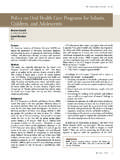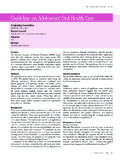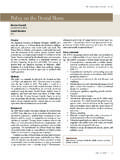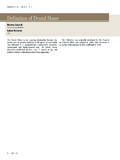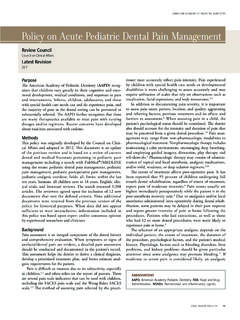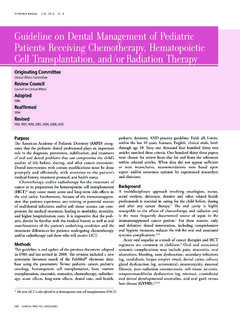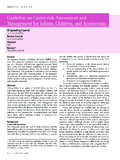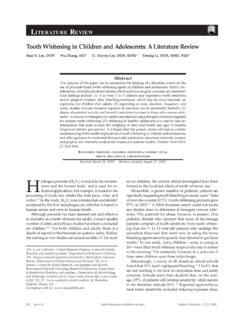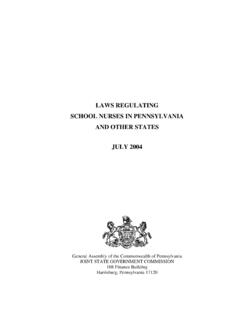Transcription of State Laws on Dental “Screening” for School-Aged Children
1 State laws on Dental screening for School-Aged ChildrenTooth decay is the most prevalent chronic condition among Children in the United More than one-quarter of US preschoolers (28%) have experienced visible cavities ii well before entering school . The consequences of Dental disease have taken a toll on Children , their families and communities. This has led policymakers to consider a variety of strategies to address the oral health burden among US Children . A policy approach that has received increasing attention in recent years is the development of State laws that require or provide for some form of certification of a Dental screening , examination, or assessment for school entry.
2 This Policy Brief was developed for Dental public health professionals and others interested in quantitative and qualitative information about these State laws . Information is derived from legal research and key informant interviews completed during May and June of 2008. This analysis addresses State laws only and, therefore, does not capture other policies at the State and local level that may relate to Dental requirements or programs for School-Aged Children . BACKGROUND According to the Council of State Governments, in 2007 State lawmakers adopted nearly 70 bills on the topic of oral Included among these measures are State laws that require parents to provide certification of an oral health assessment as a condition of school entry (California) and require evidence of a Dental screening prior to elementary school and high school (Iowa).
3 A third State (New York) approved a requirement in 2007 that schools request a Dental health certificate upon a student s entrance into school or upon entry into K, 2nd, 4th, 7th, and 10th grades. In April 2008, Kentucky s Governor signed legislation to require student Dental health certificates. These new laws add to the group of laws adopted by states as far back as 1915 (Kansas) and 1945 (Pennsylvania). More recent laws adopted over the last two decades include those in Georgia, Illinois, Nebraska, Oregon, Rhode Island, and the District of Columbia. Overall, about a quarter of the states (12) now have some requirement for a Dental certificate for School-Aged Children .
4 Terminology and Definitions The requirement in State law is principally the completion of a form and/or a certificate that demonstrates a screening , examination, or assessment has taken place within the allotted timeframe. While the preponderance of states with Dental screening /examination laws require parents to find Dental professionals to complete a Dental certificate, Kansas, Pennsylvania, and Rhode Island engage school -based Dental providers (the history of these laws could not be fully captured in this document). Emerging Issues in Oral health October 2008 - 2 - State laws often do not include definitions of the requisite screening , examination, or assessment.
5 A State law may use a term such as Dental examination, but the requirement for its Dental certificate can be fulfilled by a Dental screening or assessment. Radiographs (x-rays) are a widely accepted component of a complete Dental examination as is conducted by a dentist, whereas Dental screening or assessment (often used interchangeably in these programs) implies a less complete, less technical review not necessarily conducted by a dentist or even a Dental professional. It appears that in some instances the choice of form ( , Basic screening Survey form developed by the Association of State and Territorial Dental Directors) effectively defines the requirement.
6 Overall, implementation of screenings rather than examinations appears to be the most common practice. Key informants have indicated their interest in clarifying statutory language to align with what is actually being done in communities. Rationale A common rationale for State screening laws is to identify Children in need of care so that parents can be made aware of the need for treatment. However, State laws do not typically require, fund, and track referrals for further evaluation or treatment as, for example, the Head Start program seeks to do. Many key informants interviewed about their laws identified the conundrum posed by State policies that identify Children in need of treatment but do not systematically provide options for their care.
7 Key informants also suggested, however, that screening mandates may increase awareness of oral health among families and policymakers. Research on public perceptions of oral health in response to screening laws would illuminate the effectiveness of screening for this purpose and would assist in determining its value relative to other oral health interventions, particularly when resources are limited. Evidentiary Gap The World health Organization has suggested that school Dental screenings could enable early detection and timely interventions towards oral diseases and conditions, leading to substantial cost savings, iv but evidence for State Dental screening laws Rhode IslandDistrict of Columbia - 3 -this desired outcome is lacking.
8 The most extensive studies of school screening effectiveness both a randomized trial and a historical review are from England where screenings were nationally mandated for 90 years. According to the British research team, The evidence from the UK and elsewhere is that while the concept of Dental screening is attractive to policymakers, there is no scientific evidence that it leads to improvements in health , either for individual Children or for the child population. v,vi This evidentiary gap is recognized by the American Academy of Pediatric Dentistry (AAPD) in a policy statement (adopted 2003, revised 2008) confirming that Data [are] not available to determine the effectiveness of various approaches by states that currently encourage school -entry Dental examinations.
9 Viii The Centers for Disease Control and Prevention (CDC) has not taken an official position on mandatory school -entry Dental screening approaches. Political Support Despite general lack of evidence in support of school screenings and a randomized control trial that found evidence against the practice, political support for the practice is strong and widespread as suggested by the adoption of this practice in 12 states . Dental professional organizations such as AAPD and the American Dental Association (ADA) are supportive of this approach. AAPD s 2008 policy statement recommends [l]egislation mandating a comprehensive oral health examination by a qualified dentist for every student prior to matriculation into school viiii and the ADA s 2005 policy urge[s] State Dental associations to sponsor legislation to provide oral health assessments for school Children .
10 Xi Stakeholder involvement in the adoption of screening legislation varies across states , but when engaged may include advocacy groups, coalitions, Dental associations, parents, and State department(s) and other government officials. METHODS Research on Legal Authority and Content of laws Research was conducted through a legal search using LEXIS and Westlaw search engines, a literature review using Medline and Google, and directed queries to identify relevant statutes. Identified laws were reviewed based on a content-analysis checklist. Relevant statutory and regulatory provisions were identified using search terms including Dental screening , Dental inspection, Dental program, Dental examination, Dental exam, and combinations of the terms Dental , health , and child.
